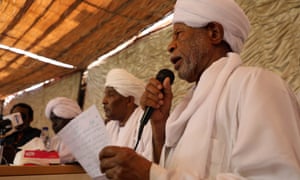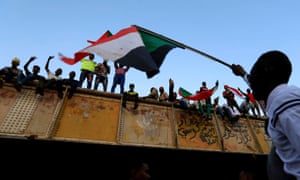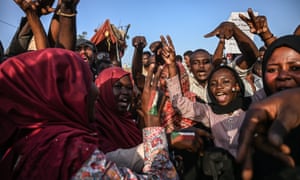Date: Sunday, 05 May 2019
Islamist parties that supported the Bashir regime are now facing challenges
 Ibrahim al-Senoussi, a former Bashir aide, speaks at a press conference a day after the attack on a Popular Congress party meeting. Photograph: AP*******
Ibrahim al-Senoussi, a former Bashir aide, speaks at a press conference a day after the attack on a Popular Congress party meeting. Photograph: AP*******
As members of Sudan’s Islamist Popular Congress party arrived for a meeting in Khartoum one Saturday afternoon, they were greeted by abuse from groups of young protesters and chants of “no to Islamists”.
In the scuffles that followed, both sides threw stones. Dozens were injured and more than a hundred were arrested.
“It happened just after we started the meeting,” said PCP member Qusai Abdalla, 38. “Some of the attackers came with fuel to burn everyone inside the hall, but we defended ourselves by throwing stones back at them.
“I think some of them wanted us to die. And when we looked on social media, we found out there were people from the protest movement who were saying that the Islamists are holding meetings – go to them. There was clear incitement.”
It has not been an isolated incident. In the aftermath of the fall of Omar al-Bashir on 11 April, the role of Sudan’s Islamist parties, some of whom long sustained his regime, has been placed increasingly under a spotlight.
Where once political Islamists styled themselves as kezain – invoking an image of themselves to Sudanese as drinking vessels from which the faithful could imbibe Islam – the term has been turned back on them by Sudanese as a term of abuse, shouted by those who disrupted the PCP meeting.
On Friday, worshippers at the Anas Ibn Malik mosque in Imtidad Nasir in Khartoum demanded Naji Abdallah, a prominent member of the PCP, leave the mosque after he denounced the protests in a speech at the end of Friday prayers. The imam of the Kafouri mosque in Khartoum North was also pressed to leave the mosque for similar reasons.
In a separate move, three Islamist generals on the country’s new transitional military council were quickly forced out, and in the immediate aftermath of the incident at the PCP meeting, ultraconservative preacher Abdel-Hay Youssef, whose party also backed Bashir, was denied permission by the military to hold his own rally called to support sharia law.
 Sudanese flags are waved at an anti-government protest outside the defence ministry in Khartoum on Tuesday. Photograph: Mohamed Nureldin Abdallah/Reuters
Sudanese flags are waved at an anti-government protest outside the defence ministry in Khartoum on Tuesday. Photograph: Mohamed Nureldin Abdallah/Reuters
It is evidence, observers say, that the long influence of Sudan’s political Islamists is being challenged as never before, a fact that is unsettling many in the Islamist parties, fearful that the current negotiations between the army and Freedom and Change, the umbrella group representing the street protesters behind Sudan’s revolution, will leave them in the cold.
“We are not bound by any agreement that we are not part of,” Ali al-Haj, the PCP’s secretary general, declared testily on Sunday about the ongoing talks for a joint civilian military council to guide the country’s post-Bashir political transition. “We will not accept any agreement excluding the other political forces [ie parties like his]. This is a principled position.”
All of which is significant in a country where, for three decades, the military and Islamist political parties have operated hand in hand even if – as so often in Sudan’s turbulent and fractured politics – that meant alliances made, broken and refashioned as Bashir manoeuvred to shore up his power.
The story of the PCP’s founder, Hassan al-Turabi, a lawyer and Islamic scholar who died in 2016, is a case in point.
The ideological architect of the National Islamic Front, which later morphed into Bashir’s National Congress party, Turabi first codified sharia law in Sudan’s legal system in 1983 as attorney general – and then helped Bashir take power through a military coup in 1989 in alliance with Islamists.
At the height of Turabi’s influence, he tried to transform Sudan into an Islamist centre inviting everyone from moderate Islamist political figures such as Tunisia’s Rachid Ghannouchi to Osama bin Laden, who was based in Sudan in the 1990s.
After falling out with Bashir in the late 1990s, Turabi formed his own opposition party but Turabi and the PCP moved back in recent years towards Bashir. They did not oppose the Bashir regime in the last major round of street protests in 2013 and remained part of the governing coalition until Bashir’s removal earlier this month.
That remained the model of Bashir’s way of doing business until his fall: co-opting an Islamist ideology into a military regime while keeping the Islamist parties at arms’ length when they threatened his power or bringing them back in when he needed their support.
Analyst Hafiz Ismail is among those who sees the fall of Bashir as a significant setback for Sudan’s Islamist parties in the mould of Turabi’s PCP. “It is very significant change,” he said, explaining that political Islam’s association with the regime had become toxic for it.
“Before the coup [in 1989], the slogan was ‘Islam is the solution’. But after 30 years of power, after 30 years of corruption and killing, they can’t claim high moral ground any more.
“[These parties] won’t be able to get elected again. The Islamist parties exposed themselves with the way they have behaved since they took over after the military coup, which is why I don’t think they have any chance in a democratic process. It’s the reason political Islam has no future.”
 Protesters at a sit-in outside the army headquarters in Khartoum on Tuesday. Photograph: Ozan Köse/AFP/Getty Images
Protesters at a sit-in outside the army headquarters in Khartoum on Tuesday. Photograph: Ozan Köse/AFP/Getty Images
Well-known columnist Shamael Elnour said: “I don’t think their future is bright. There’s a strong sense of hatred among the people in Sudan towards them and towards political Islam in general.
“They supported the previous regime during its brutal campaign against the protesters for the last four months. For all these reasons, I don’t think they have no political future.”
The PCP’s Qusai Abdalla is not convinced. He suggests recent events have been calculated to drive a wedge between parties like his and the protesters who helped bring down Bashir.
“I believe there are people who want to drag the country into conflict between the Islamists and the leftists,” he said. “That’s why they made this attack on us, but the Islamic parties will remain in Sudan, because Sudan is an Islamic country.”